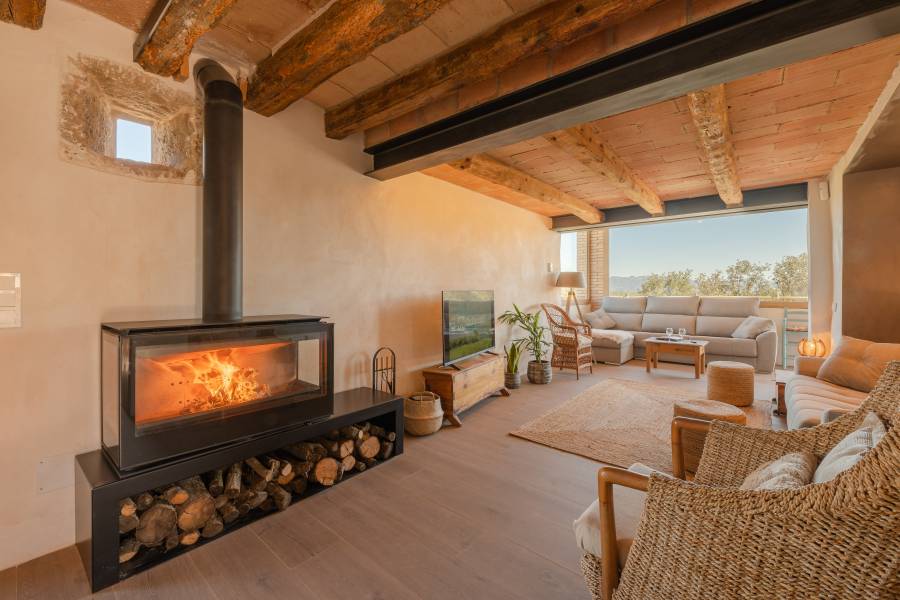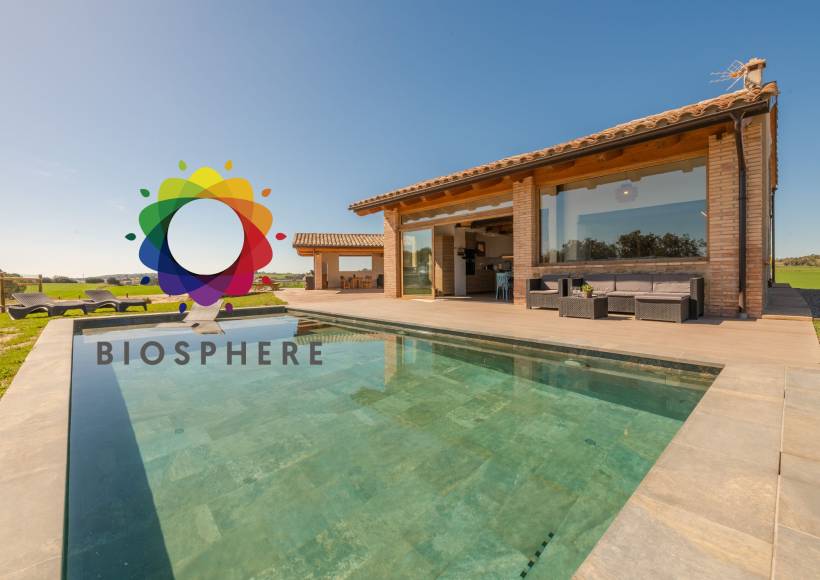The Biosphere certificate is an international recognition that certifies a company or destination complies with sustainability criteria aligned with the United Nations Sustainable Development Goals (SDGs). This certificate ensures that the accommodation adopts environmental, economic, and social responsible practices.
In a market increasingly oriented towards ecotourism, commitment to sustainability has become a key factor for tourist accommodations. Guests are increasingly valuing green stays that respect the environment, and obtaining certifications that accredit good sustainable practices can be a great competitive advantage.
In this article, we will discover what are the requirements and benefits of the Biosphere certificate and see a specific success case: Casa Rural Muntuliu, in Berguedà, a house managed by Naturaki that has made sustainability one of its fundamental pillars.
How to obtain the Biosphere certificate for a rural house?

To obtain the Biosphere certificate, a rural house must demonstrate that it follows a sustainable management model, incorporating good practices in various areas. These practices can be adapted to the characteristics of each accommodation, always ensuring an improvement in sustainability.
1. Sustainable management
It is necessary to establish a sustainability plan that includes environmental, social, and economic management criteria, with actions aimed at reducing environmental impact and promoting responsible tourism.
Possible actions include:
✔ Implementing measures for an efficient use of natural resources.
✔ Training the work team in sustainable best practices.
✔ Carrying out a periodic follow-up of sustainability indicators (water consumption, energy, waste generation, etc.).
2. Energy efficiency
Ensuring energy saving is one of the basic principles of the Biosphere certificate. To achieve this, each accommodation can adopt the solutions that best suit their reality.
Some of the measures that can be implemented are:
✔ Use renewable energies such as solar panels, aerothermal or biomass, if the accommodation considers it viable.
✔ Improve thermal insulation to reduce energy expenditure.
✔ Incorporate LED lighting or saving devices like timers and presence sensors.
3. Water Management
Another key aspect is to ensure a responsible use of water. There are several ways to optimize its consumption, depending on the needs and characteristics of each rural house.
Some actions that can be implemented are:
✔ Install water saving systems such as aerators in taps and showers.
✔ Apply water reuse strategies, such as rainwater collection for irrigation use.
✔ Monitor water consumption to detect possible excesses or leaks.
4. Waste reduction and recycling
Promoting waste reduction and recycling is essential to minimise the environmental impact of the accommodation.
Some actions that can be taken include:
✔ Facilitating the separation of waste through accessible recycling containers.
✔ Reducing the use of single-use plastics and promoting reusable alternatives.
✔ Using eco-friendly cleaning products and sustainable materials in the decoration and maintenance of the house.
5. Protection of the natural environment and biodiversity
Rural houses must ensure the conservation of their natural environment and promote local biodiversity.
Some practices may be:
✔ Preserve the native flora and fauna, avoiding the use of harmful chemicals.
✔ Promote green spaces that favour biodiversity.
✔ Adapt the architecture and construction materials to the natural environment.
6. Social and cultural commitment
Biosphere also values the support for the local community and the promotion of cultural heritage.
Some possible actions are:
✔ Collaborate with local suppliers for purchasing local products.
✔ Publicize the local culture and traditions through activities and information for guests.
✔ Participate in social projects that benefit the community.
7. Boost of responsible tourism
Some possible actions are:
✔ Promote environmentally friendly touristic activities, such as sustainable hiking, cultural routes, or ecological experiences.
✔ Provide information to guests about how they can reduce their environmental impact during their stay.
Benefits of obtaining the Biosphere certificate

Obtaining this certification not only has advantages for the environment, but also brings economic and commercial benefits to the rural house.
1. Improvement of reputation and attraction of new customers
✔ The Biosphere certificate distinguishes the country house as an accommodation committed to sustainability.
✔ More and more tourists are looking for eco-friendly stays that respect the environment.
✔ Appearing in sustainable tourism directories can increase visibility and attract more bookings.
2. Reduction of operational costs
✔ Improvements in energy efficiency and water management reduce supply expenses.
✔ Better waste management reduces costs associated with waste treatment and disposal.
3. Access to aids and subsidies
✔ Many public administrations and institutions offer assistance to sustainable tourism businesses.
✔ The certificate may facilitate access to financing programs for improvements in sustainability.
4. Competitive Distinction
✔ Differentiate the rural house from other uncertified accommodations, offering an added value to guests aware of the environment.
5. Contribution to the Sustainable Development Goals (SDGs)
✔ Being part of the Biosphere certificate network means actively contributing to more responsible and sustainable tourism.
6. Improvement of the guests' experience
✔ Customers can enjoy a more comfortable, healthy, and harmonious stay with nature.
✔ Sustainability not only benefits the environment but also improves the well-being of the visitors.
Success Story: Muntuliu Rural House (Berguedà)

A clear example of sustainable accommodation certified with the Biosphere seal is Casa Rural Muntuliu, in Berguedà. This rural house, managed by Naturaki, has implemented various actions to become a benchmark for sustainable tourism.
What actions has Casa Rural Muntuliu implemented?
✅ Renewable energy: Uses solar panels for energy self-sufficiency and efficient aerothermal and insulation systems to reduce consumption.
✅ Efficient water management: It has rainwater reuse and water-saving systems in faucets and showers.
✅ Local products: Prioritizes consumption and contracting of local products and services, enhancing local economy.
✅ Waste reduction: Encourages recycling (for example, facilitating the recycling of coffee capsules) and avoids single-use plastics.
✅ Sustainable activities: It promotes hiking and cycling routes to enjoy the surroundings in a respectful way. Here you will find a selection of the best routes in the area proposed by Casa Rural Muntuliu.
Thanks to measures like these, Casa Rural Muntuliu has obtained the Biosphere certificate, establishing itself as an example of sustainable tourism in Berguedà.

Obtaining the Biosphere certificate is a safe bet for rural houses that want to stand out in the sustainable tourism market. Not only does it contribute to the protection of the environment, but it also improves the profitability of the business and the experience of the guests. If you are the owner of a rural house, here you will find some tips to make your rural house more sustainable.
 Log in to your account
Log in to your account
